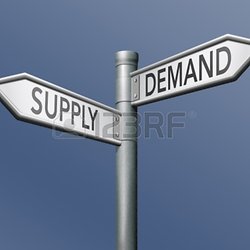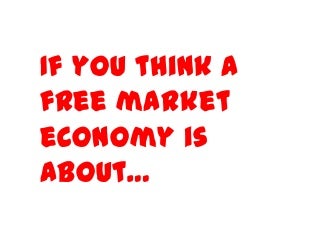 China’s latest push to be granted market economic system status (MES) underneath World Trade Organization (WTO) rules may turn into an irritant in Sino-Canadian relations. USA, Canada, England, Germany, France, Denmark, Sweden, Italy, Swiss and Norway are the also the examples of blended economic techniques. China is a blended economic system as a result of, although it went many years without government acknowledging the function that markets play, it has just lately been stress-free many restrictions on market-primarily based activity. The government now welcomes letting some industries be controlled by market forces, while at the identical time the government totally controls other (normally larger) industries. Chinese officials say this means the nation, led by the Chinese Communist Get together, should have market economic system status, also referred to as MES. Market economic system status makes it tougher for other international locations to punish a WTO trade associate with high tariffs. To enable all actors to act in harmony, the system mustn’t operate to the market.
China’s latest push to be granted market economic system status (MES) underneath World Trade Organization (WTO) rules may turn into an irritant in Sino-Canadian relations. USA, Canada, England, Germany, France, Denmark, Sweden, Italy, Swiss and Norway are the also the examples of blended economic techniques. China is a blended economic system as a result of, although it went many years without government acknowledging the function that markets play, it has just lately been stress-free many restrictions on market-primarily based activity. The government now welcomes letting some industries be controlled by market forces, while at the identical time the government totally controls other (normally larger) industries. Chinese officials say this means the nation, led by the Chinese Communist Get together, should have market economic system status, also referred to as MES. Market economic system status makes it tougher for other international locations to punish a WTO trade associate with high tariffs. To enable all actors to act in harmony, the system mustn’t operate to the market.
Nonetheless, the European Union, the United States and some other international locations do not agree that China must be given MES. China’s economic system is slowing now after expanding for about 25 years at a fee of 10 p.c or more. This 12 months, the world’s second largest economic system is anticipated to grow by less than seven p.c. China considers market economic system status necessary to its efforts to increase or no less than assist trade levels. The word dumping describes selling exports for a cheaper price than they are offered in their residence market or beneath the cost of production. Scott Kennedy is director of the Challenge on Chinese Business and Political Economic system at the Heart for Strategic and International Studies in Washington.
Nonetheless, a latest editorial in the Communist Get together’s Folks’s Day by day” mentioned it’s not a difficulty of letting China receive market economic system status. At the end of this 12 months, China believes it must receive Market Economic system Status (MES). This may enable China to get pleasure from the same market status as the U.S. and European Union in relation to anti-dumping investigations before the World Trade Organization.
In its quest to grow its economic system over the past twenty years, China has turn into the leading producer — by far — of steel, aluminum, cement and other industrial materials. Reaching market economic system status would in the end put China on the same stage as the U.S. and E.U. in the eyes of the WTO, taking what some already contemplate a world trade warfare to new heights. A change in status would impression Western manufacturers as well as importers, distributors and several other other parties on many levels.
In China’s defense, after being battered by falling demand and corresponding development levels the past few years, the country is struggling to take care of supporting its growing economic system — and its citizens. The NAFTA international locations — Canada, Mexico and the U.S. — are categorised as market economies. The former Soviet Union and China are both prime examples; these are thought of non-market” economies (NME). Poland was the first orthodox centrally planned economic system to turn into a GATT (pre-WTO) contracting get together in 1967, followed by Romania in 1971 and Hungary in 1973. After the collapse of the Soviet Union in 1991, former satellites moved from centrally planned to market economies, formally changing into transition economies. Every phenomenon of market may be country specific elective acts of those who in the same Act.
